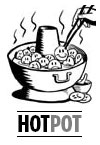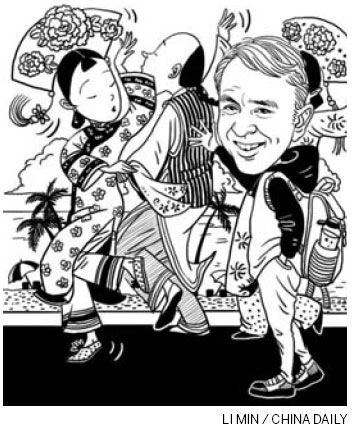Rod piercing or blood rituals, it's all about people
By Patrick Whiteley (China Daily)
2010-12-30 12:57
 |
Large Medium Small |
Three young men holding incense sticks danced frantically before a religious shrine, which housed small, bearded, king-like figurines. The dancers' eyes were half closed as they slammed into each other in a semi-trance. Some would say they were possessed.
Local villagers crowded around them, some watching in fascination, others looking on with mild interest because they had seen this ritual many times before. These young men would soon pierce their faces with long steel rods, in through one cheek and out through the other.
The ceremony was part of a Hainan village anniversary celebration, which commemorates the time when the first families formed a community many centuries ago.
The location was a village about 2 hours' drive from Haikou, the capital of Hainan province, where I had relocated to study Chinese for three months.

Hainan is a great place to study Putonghua because the weather is warm, life is cheap and very few people can speak English. And like most places I've visited in China, the locals are warm and inviting.
I befriended a Sichuan restaurant owner, whose wait staff came from local villages and thanks to the invitation of one of those girls I was standing in that village square, where the cheek piercing occurred. More than 4,000 people had gathered for the village festival and I was the only foreigner.
But the trance dancers were not the only act in the afternoon matinee. About 20 meters from the altar were men and women dressed in elaborate Qing Dynasty (1644-1911) costumes and were dancing and singing songs. The two acts were a contrast - one was ordered and rehearsed, the other was out-of-control improvisation.
Sometimes the trance boys would drift away from the altar and bounce around the costumed performers, who rolled their eyes with annoyance. The altar boys were stealing the limelight. Then, as the village leader began to speak on a microphone, welcoming everybody to the festival, one frenzied fellow ran to him and tugged at his short-sleeved white shirt. The village boss wasn't bothered. He'd seen it all before and shoved him away.
I wasn't sure what was going on, nor did my Sichuan restaurant owner friend, but the waitress said this unusual show happened every year.
The majority of the crowd, which had come from farms far and wide, was amused by the entertainment. Many were young men, sitting on their scooters, scanning for future girlfriends. For the older folks, it was just a good excuse to see old friends.
The shindig was a bit like a country fair held in many places around the world. The main difference was steel rod piercing.
Different pokes for different folks, I say.

At another fair I saw a wild-eyed villager holding a chicken as he ran through the crowd demanding everybody clear his path. Two younger men followed, pushing people out of the way until they reached a spot where the bird met its doom.
Like the other Hainan festivals, the strange ritual was just a small part of the event. The major point of these community events was the gathering of people.
Blood sacrifices are such age-old traditions, and it is unusual to witness one in the modern day. But who was I to judge, considering I celebrate Christmas, another age-old festival, which is based on the story of a blood sacrifice. Washed by the Blood of the Lamb, is a popular hymn sung in many Christian churches.
The Bible says Jesus Christ was the lamb of God who came to shed his blood for the world and his death is connected with the ancient Jewish ritual of sacrificing animals.
And for many, the Christmas festival is about the gathering of family and friends.
Whether you're from Hainan, Hong Kong, Hawaii or Honduras, it's always the people that matter.